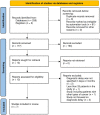Diagnostic delay of oral squamous cell carcinoma and the fear of diagnosis: A scoping review
- PMID: 36405204
- PMCID: PMC9669962
- DOI: 10.3389/fpsyg.2022.1009080
Diagnostic delay of oral squamous cell carcinoma and the fear of diagnosis: A scoping review
Abstract
The mortality rate of patients affected with oral squamous cell carcinoma (OSCC) has been stable in recent decades due to several factors, especially diagnostic delay, which is often associated with a late stage diagnosis and poor prognosis. The aims of this paper were to: analyze diagnostic delay in OSCC and to discuss the various psychological factors of patients with OSCC, with particular attention to the patient's fear of receiving news regarding their health; and the professional dynamics related to the decision-making processes in cases of suspected OSCC. A preliminary review of literature focusing on OSCC diagnostic delay was performed. Seven articles were included with the diagnostic delay ranging from 45 days to approximately 6 months. Patients' fears and, to a lesser degree, the concerns of dentists, were found to be still poorly investigated. On the basis of the authors' professional experience, the development of oral lesions of unknown origin may generate different behaviors in the decision-making processes by patients and clinicians, and fear may play a key role in the distinct steps of this process. It is crucial to increase awareness and inform patients about the onset of OSCC, and contemporaneously encourage experimental studies on patients' fear and professional behaviors with respect to communication regarding OSCC.
Keywords: cancerphobia; fear; oral squamous cell carcinoma; patient delay; professional delay; treatment delay.
Copyright © 2022 Mauceri, Bazzano, Coppini, Tozzo, Panzarella and Campisi.
Conflict of interest statement
The authors declare that the research was conducted in the absence of any commercial or financial relationships that could be construed as a potential conflict of interest.
Figures
References
-
- Bazzano M., Mauceri R., Panzarella V., Di Fede O., Pizzo G., Coniglio R., et al. (2021). Humanization of dental treatments. An emerging trend. Dent. Cadmos 89, 96–103. doi: 10.19256/d.cadmos.02.2021.04 - DOI
Publication types
LinkOut - more resources
Full Text Sources


